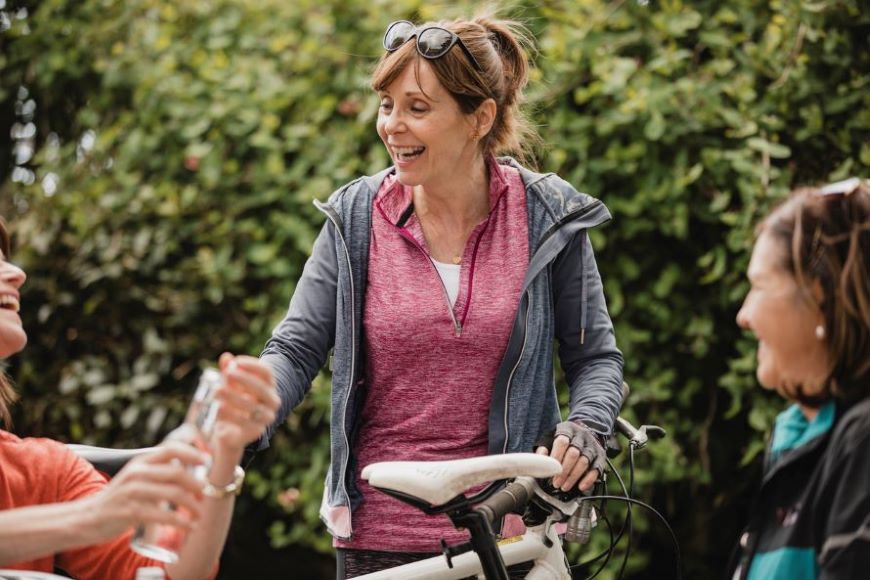_ RCGP Learning
Blog entry by _ RCGP Learning
Stress is a problem
 Being a GP can be an extremely varied and rewarding career, but the pressure of dealing with an ever-increasing number of patients every day can take its toll. It’s estimated that GPs in England alone provide first contact care to more than 1.2 million patients per day1. Many practices struggle with staffing levels, meaning that some GPs are taking on even larger list sizes than before.
Being a GP can be an extremely varied and rewarding career, but the pressure of dealing with an ever-increasing number of patients every day can take its toll. It’s estimated that GPs in England alone provide first contact care to more than 1.2 million patients per day1. Many practices struggle with staffing levels, meaning that some GPs are taking on even larger list sizes than before.
According to the Ninth National GP Worklife Survey2 of 2195 GPs, the average reported working week was 41.8 hours, which has stayed consistent since 2008. Nine out of ten GPs reported experiencing considerable or high pressure from increasing workloads, amongst other stressors such as paperwork and having insufficient time in the working day to do their jobs. The 2015 Commonwealth Fund International Survey of Primary Care Physicians found that GPs in the UK had the highest levels of stress out of the 10 nations surveyed3
A GP’s personal life can also be affected. The GMC’s 2018 report on ‘The state of medical education and practice in the UK’ found that 72% of younger GPs feel that their work-life balance has deteriorated as a result of their stress at work. The report also found that one out of four doctors had considered leaving the medical profession at least every month. One of the most alarming findings was that two out of every 100 doctors said that they had to take a leave of absence due to stress for at least one month in the last year4.
With many GPs regularly fearing that they can’t cope in their current roles, it’s not surprising that burnout is increasing. The BMA’s 2019 report on ‘Caring for the mental health of the medical workforce’ found that a total of 88% of GP partners and 85% of sessional GPs face a 'high' or 'very high' risk of burnout5. Regional reports from the RCGP found that a proportion of GPs feel so stressed that they are unable to cope. The figures for this were 31% in Wales6, 37% in Scotland7 and 32% in Northern Ireland8.
Recognising the signs of stress and burnout
Even though GPs are expected to recognise the signs in their patients, they may not always realise that they are stressed themselves. It’s easy to plough on with day-to-day tasks and to become consumed with work, so the tell-tale signs such as irritability, poor sleep and increased alcohol use may be missed. The NHS website page on stress includes lists of the physical, mental and behavioural symptoms that may be overlooked.
The NHS Practitioner Health Programme (PHP) was launched in 2008, with the addition of the NHS General Practitioner Health Service (GPH) in 2017. These services aim to provide support to practitioners who are struggling with mental health or addiction problems, so that they can find help before these issues escalate further. According to the PHP’s report on their first 10 years of service, around half of all PHP patients are GPs. Between 2008 and 2018, over 5000 doctors presented to PHP and 83.5% of these were due to mental health problems. For GPs specifically, this figure rises to 88%, with 10% presenting with addiction problems. The remaining 2% is classified as ‘other’1. In general, NHS staff have higher sickness rates than the rest of the economy. The latest sickness absence reports, from NHS digital, show that the sickness rate is now at 4.23% in England. From the sicknesses reported, 27.1% of Full Time Equivalent (FTE) days were lost due to anxiety, stress, depression or other psychiatric illnesses9.
Dealing with stress
 Resilience is mentioned a lot in relation to managing stress. It can be defined as “the ability to adapt and succeed in the face of adversity and stress”. A resilient person can maintain their wellbeing and continue moving forward when they are tested by life’s difficulties. Being resilient doesn’t come naturally to everyone and can be something to develop over time. The Chartered Institute of Personnel and Development have produced ‘Developing resilience: a guide for practitioners’ which contains evidence-based guidance. NHS England also looks at resilience from a clinician’s point of view and summarises the 'Eight principles for being a resilient doctor' which are set out by the Australian Medical Association. These principles focus on the changes that can be made in everyday life to help with developing resilience.
Resilience is mentioned a lot in relation to managing stress. It can be defined as “the ability to adapt and succeed in the face of adversity and stress”. A resilient person can maintain their wellbeing and continue moving forward when they are tested by life’s difficulties. Being resilient doesn’t come naturally to everyone and can be something to develop over time. The Chartered Institute of Personnel and Development have produced ‘Developing resilience: a guide for practitioners’ which contains evidence-based guidance. NHS England also looks at resilience from a clinician’s point of view and summarises the 'Eight principles for being a resilient doctor' which are set out by the Australian Medical Association. These principles focus on the changes that can be made in everyday life to help with developing resilience.
Taking time to improve wellbeing can be a good stress-reliever. The New Economics Foundation (NEF) outlines ‘Five ways to wellbeing’, These consist of:
- Connect – Make time for family and friends. Build relationships with colleagues and neighbours. Become part of your local community.
- Take notice – Think about what matters to you most and take time to appreciate it. Be aware of your feelings and emotions. Try meditation and mindfulness.
- Keep learning – Try something new and embrace new experiences. Learning a new skill can boost your confidence and create an escape from stressors.
- Be active – Think about which physical activity you enjoy and that suits you. Regular exercise is associated with lower rates of depression and anxiety and helps to slow down age-related cognitive decline.
- Give – Do something nice for a friend or stranger or volunteer your time to the community. Feeling part of a wider community can be rewarding and build connections with those around you.
In order to ensure the wellbeing of doctors in their workplace, the GMC outline an ‘ABC of doctors’ core needs’. When these needs are met, it’s suggested that people are more motivated and have better overall health and wellbeing. Even if one of the needs is not met, it can have a negative impact on a doctor’s wellbeing and motivation. The following needs are taken from the GMC’s ‘Caring for doctors Caring for patients’ report10
- Autonomy or control – the need to have control over our work lives, and to act consistently with our work and life values.
- Belonging – the need to be connected to, cared for, and caring of others around us in the workplace and to feel valued, respected and supported.
- Competence – the need to experience effectiveness and deliver valued outcomes, such as high-quality care.
The RCGP recognises that being a GP is one of the most difficult jobs in medicine. As the first point of contact for most patients, a GP sees an average of 41 patients per day11. The RCGP’s ‘Fit for the Future’ campaign is the College’s vision for the future of general practice. It covers the changing role of the GP, the tools and skills needed to fulfil this role and the vision of an expanding general practice workforce. This campaign outlines the ways that primary care can adapt to ever-changing health needs and ultimately help to relieve the dangerous levels of stress that GPs currently face.
Further information about the ‘Fit for the Future’ campaign can be found on the RCGP website.
Getting help
 For any GPs who are struggling with the pressures of their role or showing signs of stress or burnout, the following resources may help:
For any GPs who are struggling with the pressures of their role or showing signs of stress or burnout, the following resources may help:
- NHS GP Health service – Confidential service for GPs and GP trainees in England. It can help with issues relating to mental health, including stress or depression, or addiction problems. It’s provided by health professionals with expertise in addressing the issues concerning doctors. The BMA also have a support service that is open to the whole of the UK.
- Online cognitive behavioural therapy (CBT) – This can be accessed via your local ‘Improving Access to Psychological Therapies’ scheme in England. In Scotland, there are online self-help resources available on ‘Moodjuice’. The ‘Living Life to the Full’ website also contains many online CBT resources that are available throughout the UK.
- The Balint Society – The society aims to help all health and social care professionals in the UK better understand the emotional content of their patient relationships. As a member of the Balint Society you can join a ‘Balint group’, which is a gathering for members to discuss particularly difficult patient cases confidentially in a safe space.
- Mentoring – Becoming a mentor or mentee provides an opportunity to develop professionally and discuss any work-based issues. In either role, mentoring can be a great way to get further insights in to your own working situation, whilst having an impartial sounding board for any difficulties experienced in your role. You can find out more about The Faculty of Medical Leadership and Management (FMLM) mentoring scheme. You can also contact your local RCGP Faculty to see if any local mentorship schemes are available. Further mentoring resources can be found on the BMA website.
- Mental health apps – A range of different apps that can help with anxiety, self-harm and exploring mindfulness are listed on the NHS website.
- Big White Wall – This website offers a support network, resources for self-management and live therapy via text, audio or secure video. It is accessible, for free, to UK serving personnel, veterans and their families, and some UK Universities and colleges. It is also available in some locations via the NHS. Eligibility can be checked via their website.
- The RCGP provides support and advice on GP wellbeing and mental health.
- A list of further support services that are specifically aimed at GPs in England can be found on the NHS website. If you are registered with GP Online, you can also access a list of support organisations on their website.
References
1 NHS Practitioner Health Service. 2018. The Wounded Healer: Report on the First 10 Years of Practitioner Health Service. [Online]. Available from: http://php.nhs.uk/wp-content/uploads/sites/26/2018/10/PHP-report-web.pdf
2 Policy Research Unit in Commissioning and the Healthcare System. 2017. Ninth National GP Worklife Survey. [Online]. Available from: http://dudleylmc.org/oldsite/archived/www.mrsite.co.uk/usersitesv22/dudleylmc.org/wwwroot/USERIMAGES/Ninth-National-GP-Worklife-Survey.pdf
3 The Commonwealth Fund. 2015. 2015 Commonwealth Fund International Survey of Primary Care Physicians in 10 Nations. [Online]. Available from: https://www.commonwealthfund.org/publications/surveys/2015/dec/2015-commonwealth-fund-international-survey-primary-care-physicians
4 General Medical Council. 2018. The state of medical education and practice in the UK. [Online]. Available from: https://www.gmc-uk.org/about/what-we-do-and-why/data-and-research/the-state-of-medical-education-and-practice-in-the-uk
5 British Medical Association. 2019. Caring for the mental health of the medical workforce. [Online].
6 Royal College of General Practitioners Wales. 2018. Transforming general practice: Building a profession fit for the future. [Online].
7 Royal College of General Practitioners Scotland. 2019. From the Frontline. The Changing landscape of Scottish general practice. [Online]. Available from: https://www.rcgp.org.uk/getmedia/6a6e4f92-1110-4c84-8ce9-589a8f4eeb48/RCGP-scotland-frontline-june-2019.pdf
8 Royal College of General Practitioners Northern Ireland. 2019. Royal College of General Practitioners Northern Ireland GPs Survey. [Online]. Available from: https://www.comresglobal.com/wp-content/uploads/2019/11/RCGP_ComRes_Northern-Ireland-GPs-Survey_Wave-4_Tables.pdf
9 NHS Digital. 2019. NHS Sickness Absence Rates, July 2019, Provisional Statistics. [Online]. Available from: https://digital.nhs.uk/data-and-information/publications/statistical/nhs-sickness-absence-rates/july-2019-provisional-statistics
10 General Medical Council. 2019. Caring for doctors Caring for patients. [Online]. Available from: https://www.gmc-uk.org/-/media/documents/caring-for-doctors-caring-for-patients_pdf-80706341.pdf
11 Pulse. 2018. GPs have almost twice the safe number of patient contacts a day. [Online]. Available from: http://www.pulsetoday.co.uk/home/finance-and-practice-life-news/gps-have-almost-twice-the-safe-number-of-patient-contacts-a-day/20035863.article